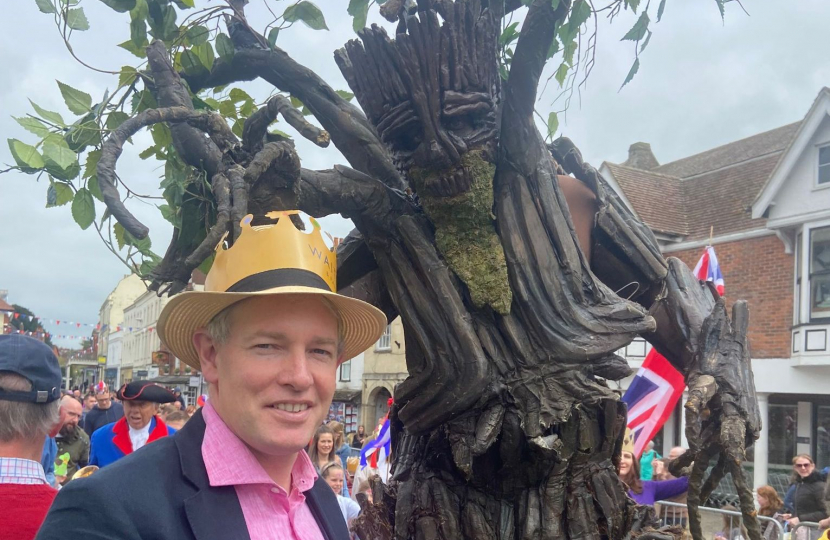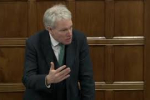
Since I last wrote the King was crowned, the Conservative Party had a ‘disappointing’ set of local election results, and I inadvertently made some headlines about family policy.
The Coronation weekend saw Wiltshire at its glorious best - well, the Sunday at least, when the rain held off. Marlborough claims to have hosted the biggest street party of any town in the country. I can believe it: we have the widest high street in England, and its whole length was full of tables, rather than parked cars as usual. It was a glorious sight, and all credit to the Town Council for a brilliant feat of organisation. Here I am with one of a pair of walking trees, like a scene from a pantomime Macbeth.

This job is frequently a great pleasure. In the last few weeks I attended the opening of the Armed Forces Community Hub and Heritage Trail, courtesy of the Armed Forces Equine Charity; I had a tour of the Avebury World Heritage Site with David Dawson from the Wiltshire Museum; I made another visit to the Great Bustards’ secret breeding ground on Salisbury Plain; and I joined the Devizes Town Council for the annual Mayor Making ceremony - complete with maces, stirrup cups, robes and chains - to install Councillor John Stevens CBE as Mayor for 2023-24.

But behind our smiling countryside and our cheery ceremonials is a more troubling reality: widespread social distress, a compound of poverty, poor physical and mental health, crime, unemployment, few opportunities and low aspirations. The distress is often most apparent in primary schools, where children manifest the trouble they’re in at home. I mention this because of a very sobering visit I paid to a primary school in one of our principal towns this month. Before I was an MP I spent many years working with prisoners and ex-offenders, and with children and families at risk, in London. The context is different but the extent of the social challenges faced at this school bears comparison with the inner city.
My political opponents will be tempted to seize on this as an admission of ‘Tory failure’ after ‘13 years in power’. In fact in the last decade school standards have risen; we have more employment; inequality (on some measures) has fallen; and so on. We can all throw partisan facts at each other. The truth is that these challenges are deep-seated. They are rooted in poverty but resistant to welfare, because the issue is not just money. It’s about the whole economy, including the economy of the home - who gives care and how - the neighbourhood - what jobs and housing and transport there are - and wider society, including the culture. There is much to do, and I am determined to work with this school and with partners to improve life for these children and their families as much as I can.
In Parliament I spoke on the draft (very bad) global Pandemic Treaty proposed by the World Health Organisation (see here). I spoke on the Illegal Migration Bill, having been closely involved in measures to strengthen it (speech here and my explainer here). Following a delightful walk with the Ramblers about Poulshot last week, looking at stiles and paths, I was equipped to intervene in the Access to Nature debate in the Commons (here). And I spoke at greater length about prescribed drug dependence - an issue I champion through an All-Party Parliamentary Group - and specifically the opportunity for psilocybin to achieve breakthroughs in the treatment of depression and PTSD (see here). Those following the debates on the public services may be interested in posts I wrote this month on the NHS (here) and strikes elsewhere in the public sector (here). We’ve also had good news on local schools funding (here) and funding to support rural prosperity (here).
Meanwhile my Party is doing some soul-searching after some very bad (English for ‘disappointing’ which is the official term used by losing parties) local election results. We didn’t have elections in Wiltshire this year, thankfully, so I spent time campaigning in Swindon for our candidates there - to no avail, as we fared dreadfully, losing control of the council and indeed the Leader’s own seat. But closer analysis suggests the vote was closer in key wards than the bald results suggest; and governing parties generally do badly in mid-term. We have a lot to do to recover lost ground before the general election expected next autumn. I am confident that the PM’s five priorities for this year - halve inflation, grow the economy, reduce debt, cut waiting lists and stop the boats - are the right ones. Beyond them, though, we need to get some fundamentals right.
I spoke about this at the National Conservative conference in London this week. The conference attracted a lot of attention, most of it negative; but this doesn’t dismay me. The flak comes when you’re over the target, and this conference addressed the right issues: our unbalanced economy, our dismantled culture, our strained family life. In my speech (which you can read in full here or watch here) I addressed all these issues. What did dismay me was the reaction to my remark that the ‘normative’ married family is the ‘only basis for a safe and stable society.’
I did not say (as I was accused of saying) that only this type of family is safe, or capable of succeeding, or morally acceptable; or that people should stay in abusive marriages. I am not that stupid or nasty. To avoid misrepresentation I should have stated the obvious truth that unmarried couples, gay couples and single people make excellent parents too. My point was that our society is based on the principle that people who have kids together have obligations to each other and to their children; that it is good when these obligations are recognised and formalised in marriage, for marriage is proven to help keep couples together and families stable; that a society which is not based on marriage is one lacking an essential foundation for security. This is not to criticise people who by choice or circumstances do not fit this ‘normative’ pattern. I regret causing such outrage and particularly for giving pain to people for whom these issues are very personal. But, within the bounds of civility and sensitivity, I am determined to tell the truth as I see it, and press for reforms that I believe will help my constituents and British citizens generally to live flourishing lives.




